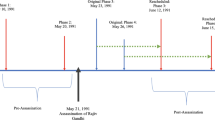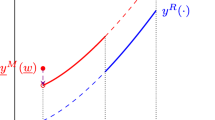Abstract
The interpretation of von Neumann–Morgenstern stable sets in voting games has been debated by most political scientists. The present paper addresses the issue in a model that consists of an infinite sequence of repetitions of the standard committee game. The analysis of equilibrium processes leads to the following conclusion: when voters are farsighted, an alternative is the limit of an absorbing equilibrium process if and only if it belongs to some stable set of the underlying committee game. While the traditional interpretation of the core implicitly assumes myopic voters, we also demonstrate that the core of a strong committee is the unique limit of all absorbing equilibrium processes, provided that voters are arbitrarily patient. We finally proceed to an analysis of the Condorcet Paradox in this dynamic context.
Similar content being viewed by others
References
Chakravorti B (1999) Far-sightedness and the Voting Paradox. J Econ Theory 84:216–226
Chwe M (1994) Farsighted coalitional stability. J Econ Theory 63:299–325
Cohen L (1979) Cyclic sets in multidimensional voting models. J Econ Theory 20:1–12
Cohen L, Matthews SA (1980) Constrained plott equilibria, directional equilibria and global cycling sets. Rev Econ Studi 47:975–986
Greenberg J (1990) The theory of social situations. Cambridge University Press, Cambridge
Harsanyi JC (1974) An equilibrium-point interpretation of stable sets and a proposed alternative definition. Manage Sci 20:1472–1495
Konishi H, Ray D (2003) Coalition formation as a dynamic process. J Econ Theory 110:1–41
Le Breton M, Salles M (1990) The stability set of voting games: classification and genericity results. Int J Game Theory 19:111–127
Le Breton M, Weber S (1992) A note on the core and Von Neumann–Morgenstern solutions of simple games. Soc Choice Welf 9:57–61
Li S (1993) Stability of voting games. Soc Choice Welf 10:51–56
Mariotti M, Xue L (2003) Farsightedness in coalition formation. In: Carraro C (ed) The endogenous formation of economic coalitions, FEEM series on economics and environment, pp 128–155
Martin M (1998) Quota games and stability set of order d. Econ Lett 59:145–151
McKelvey RD (1976) Intransitivities in multidimensional voting models and some implications for agenda control. J Econ Theory 12:472–482
McKelvey RD (1979) General conditions for global intransitivities in formal voting models. Econometrica 47:1086–1112
Muto S (1984) Stable sets for simple games with ordinal preferences. J Oper Res Soc Jpn 27:250–258
Nakamura K (1979) The vetoers in a simple game with ordinal preferences. Int J Game Theory 8:55–61
Ordeshook PC (1986) Game theory and political theory. Cambridge University Press, London
Ray D (1989) Credible coalitions and the core. Int J Game Theory 18:185–187
Riker WH (1980) Implications from the disequilibrium of majority rule for the study of institutions. APSR 74:432–446
Rubinstein A (1980) Stability of decision systems under majority rule. J Econ Theory 23:150–159
Schofield NJ (1978) Instability of simple dynamic games. Rev Econ Studi 45:575–594
von Neumann J, Morgenstern O (1944) Theory of Games and Economic Behavior. Princeton University Press, Princeton
Author information
Authors and Affiliations
Corresponding author
Rights and permissions
About this article
Cite this article
Anesi, V. Committees with Farsighted Voters: A New Interpretation of Stable Sets. Soc Choice Welfare 27, 595–610 (2006). https://doi.org/10.1007/s00355-006-0146-7
Received:
Accepted:
Published:
Issue Date:
DOI: https://doi.org/10.1007/s00355-006-0146-7




